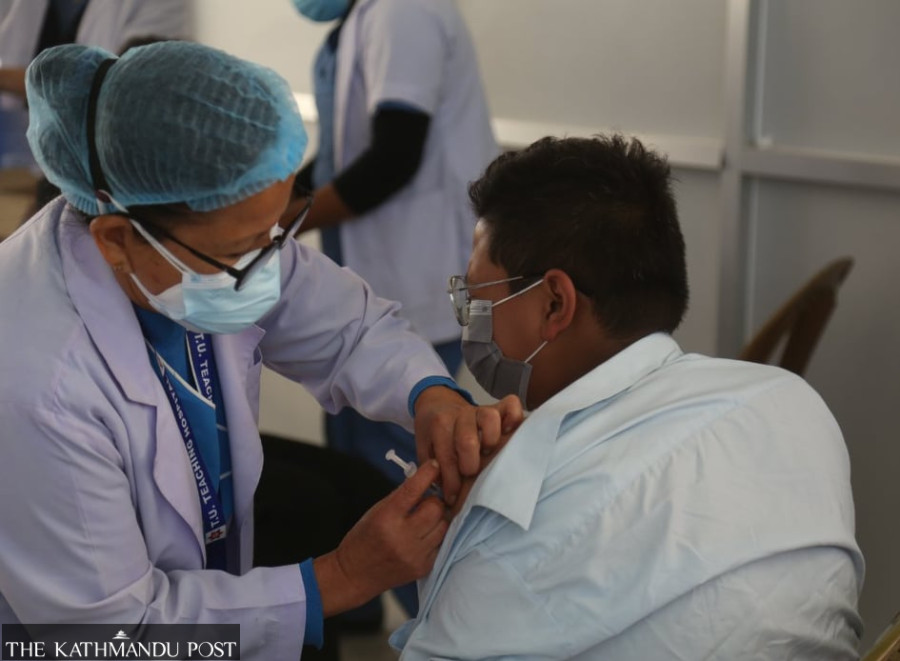Health
Covid shots alone don’t ensure 100 percent safety, continued caution needed, experts say
Around a half of the Covid-infected people admitted to TU Hospital are fully vaccinated.
Arjun Poudel
Last month, a man from Lalitpur Metropolitan City, who was fully immunised with Covid-19 vaccine died of Covid-19. The man, 81, was in good health until he got infected, doctors, who attended the deceased, said.
“He was my teacher, was fully vaccinated and had no other ailments, until he got infected,” Dr Ravi Shakya, director at Patan Hospital, told the Post. “But after getting infected with the coronavirus, he caught pneumonia and died.”
The deceased was infected during Dashain, when he gave tika to several relatives and met many people. His relatives, who were unable to receive tika and blessings from him in the previous Dashain, visited him thinking that they were vaccinated, Shakya, said.
Even though Covid cases have been falling in Nepal lately and the vaccination campaign has been scaled up, there are concerns about breakthrough infections.
Of late people stopped following public health measures—wearing face masks, maintaining social distance, washing hands and avoiding crowds. Vaccinated people have been behaving as if they got immune from the risk of Covid-19 infection and stopped following safety, which could be dangerous, according to doctors.
“Even a lot of our health workers who got infected early on and those fully vaccinated got reinfected,” said Shakya. “The number of people getting serious from Covid has declined but what we should not forget is that a significant number of people seeking treatment at our hospital were fully vaccinated.”
Data provided by the Ministry of Health and Population shows that 206 people infected with Covid-19 were admitted to intensive care units in various hospials on Wednesday. Additional 40 were on ventilator support.
“Of the total patients seeking treatment at our hospital around 50 percent are either fully vaccinated or partially vaccinated,” Dr Santa Kumar Das, deputy director at the Tribhuvan University Teaching Hospital, told the Post. “The fact is vaccinated people are also getting infected, becoming severe and dying. Vaccines don't ensure 100 percent safety.”
The World Health Organisation on Wednesday warned vaccinated people to remain cautious about the risk of Covid-19 infection. The UN health agency said that it is concerned about a “false sense of security” in many countries and communities that vaccines have ended the pandemic, and that people who are vaccinated do not need to take any other precautions.
“If you are vaccinated, you have a much lower risk of severe disease and death but you are still at risk of being infected and infecting others,” the WHO’s director general, Tedros Adhanom Ghebreyesus, said on Wednesday at a press briefing on Covid-19 crisis in Europe.
“Even if you are vaccinated, [you should] continue to take precautions to prevent becoming infected yourself, and to infect someone else who could die.”
The UN health agency said people should continue wearing masks, maintaining distance, avoiding crowds and avoiding unnecessary meetings. It also called on governments to implement a comprehensive and tailored approach of public health and social measures to prevent transmission, take pressure off health systems and save lives.
Public health experts in Nepal said that authorities concerned as well as the general public should be responsible to prevent the risk of infection and another surge.
“Still hundreds of people are getting infected every day and some are getting serious and dying,” said Dr Binajwala Shrestha, a public health expert. “Even if we are vaccinated we should not give up safety measures.”
The World Health Organisation said before the arrival of the Delta variant, vaccines reduced transmission by about 60 percent, but after the emergence of Delta, vaccines have been just around 40 percent effective at reducing transmission.
In Nepal, the Delta variant is responsible for the spread of infection since the second wave of the pandemic that hit the country in April-May and killed over 8,000 people.
“The Delta variant is responsible for the infection spread over the last several months,” said Dr Krishna Prasad Paudel, spokesperson for the Health Ministry.
Despite the risks, authorities concerned too have overlooked violations of the safety measures.
Studies suggest that vaccines too are not 100 percent effective in preventing infections. In such a context, experts say authorities must continue efforts to check the virus spread.
“Instead of enforcing strict prohibitory measures at once, authorities should continue the awareness drive and enforce the safety measures like making the face mask compulsory,'' said Shrestha.
In Nepal, 11,516 people have died of coronavirus infections since the pandemic began.
In the last 24 hours, 308 people tested positive for the coronavirus (281 in 7,104 polymerase chain reaction tests and 27 in 1,805 antigen tests). Three deaths were recorded on Thursday.
The number of active cases throughout the country currently stands at 7,349.
So far, 8,153,734 people (26.8 percent of the total population) have been fully vaccinated in the country.
Nepal has so far received 23,163,930 doses of Covid-19 vaccines—Vero Cell, AstraZeneca, Janssen and Pfizer-BioNTech.




 11.84°C Kathmandu
11.84°C Kathmandu















